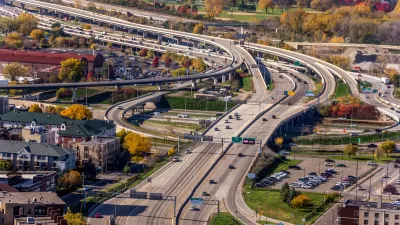Brad Plumer looks at the latest data on Americans' driving habits, which shows that vehicle miles driven have fallen an astonishing 8.75 percent since June 2005. Despite the end of the recession, driving rates continue their downward trend. But why?

Past financial crises have brought about declines in driving rates, but the sustained reduction in vehicle miles driven over the last 92 months, with no end in sight, is unprecedented. So what accounts for this trend? Plumer says that high gasoline prices are one factor, but "not the whole story."
"The other big part of the story is that young Americans are driving much, much less," he says. "Between 2001 and 2009, the average yearly number of miles driven by 16- to 34-year-olds dropped a staggering 23 percent."
"The Frontier Group has the most comprehensive look yet of why younger Americans are driving less. Public transportation use is up 40 percent per capita in this age group since 2001. Bicycling is up 24 percent overall in that time period. And this is true even for young Americans who are financially well off. Here are five big hypotheses:
- The cost of driving has gone up.
- The recession.
- It’s harder to get a license.
- More younger people are living in transit-oriented areas.
- Technology is making it easier to go car-free."
FULL STORY: Why aren’t younger Americans driving anymore?

Alabama: Trump Terminates Settlements for Black Communities Harmed By Raw Sewage
Trump deemed the landmark civil rights agreement “illegal DEI and environmental justice policy.”

Planetizen Federal Action Tracker
A weekly monitor of how Trump’s orders and actions are impacting planners and planning in America.

How Atlanta Built 7,000 Housing Units in 3 Years
The city’s comprehensive, neighborhood-focused housing strategy focuses on identifying properties and land that can be repurposed for housing and encouraging development in underserved neighborhoods.

In Both Crashes and Crime, Public Transportation is Far Safer than Driving
Contrary to popular assumptions, public transportation has far lower crash and crime rates than automobile travel. For safer communities, improve and encourage transit travel.

Report: Zoning Reforms Should Complement Nashville’s Ambitious Transit Plan
Without reform, restrictive zoning codes will limit the impact of the city’s planned transit expansion and could exclude some of the residents who depend on transit the most.

Judge Orders Release of Frozen IRA, IIJA Funding
The decision is a victory for environmental groups who charged that freezing funds for critical infrastructure and disaster response programs caused “real and irreparable harm” to communities.
Urban Design for Planners 1: Software Tools
This six-course series explores essential urban design concepts using open source software and equips planners with the tools they need to participate fully in the urban design process.
Planning for Universal Design
Learn the tools for implementing Universal Design in planning regulations.
Caltrans
Smith Gee Studio
Institute for Housing and Urban Development Studies (IHS)
City of Grandview
Harvard GSD Executive Education
Toledo-Lucas County Plan Commissions
Salt Lake City
NYU Wagner Graduate School of Public Service




























